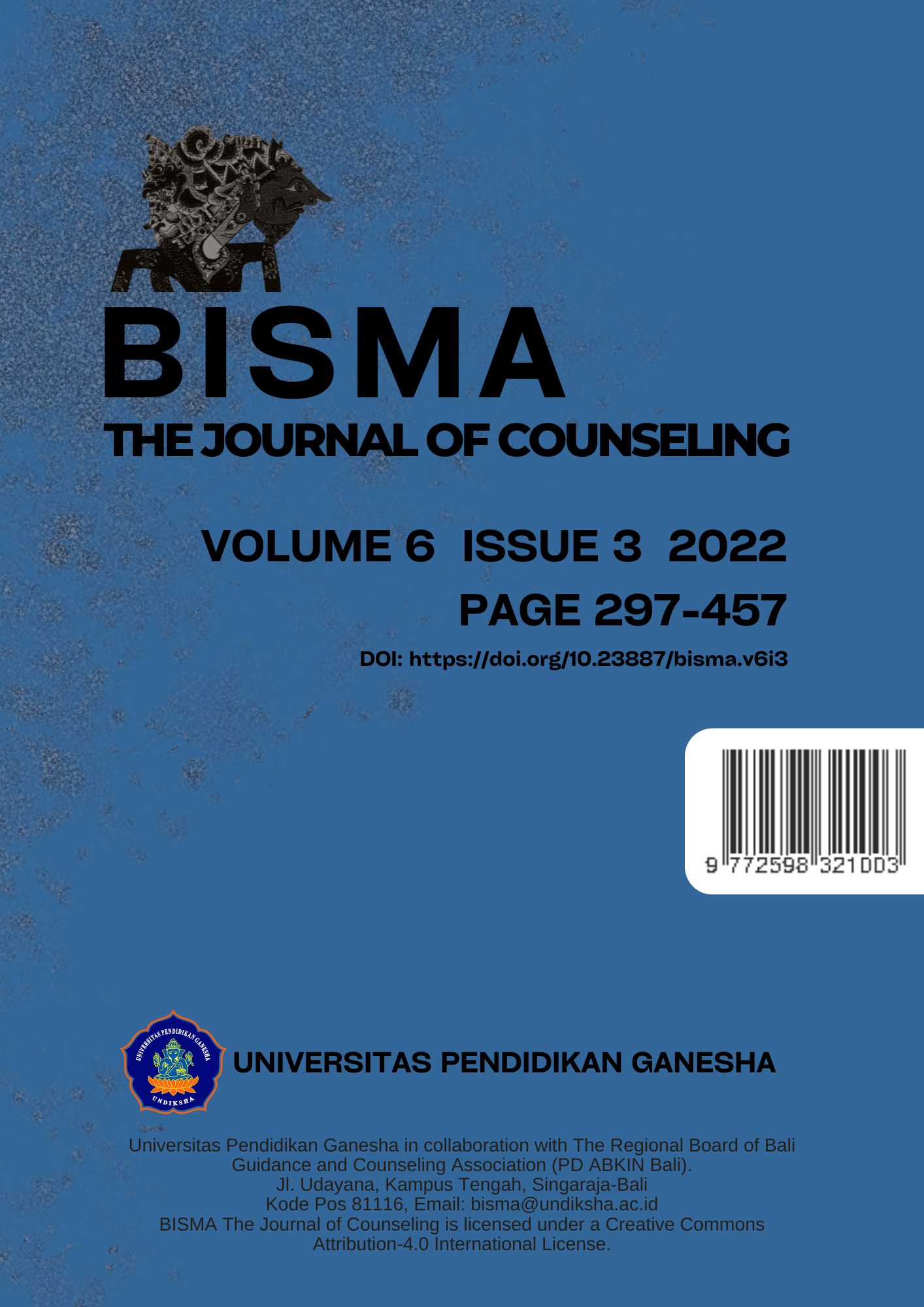Effect of Cognitive Restructuring to Increase Students' Academic Resiliense
DOI:
https://doi.org/10.23887/bisma.v6i3.56408Keywords:
Group counseling, Technique cognitive restructuring, academic resilienceAbstract
The main problem in this research is the low academic resilience of students, which is characterized by difficulties in self-adjustment when studying during a pandemic. This study aims to improve students' academic resilience through group counseling services with cognitive restructuring techniques. This type of research is a quasi-experimental one group pre-test post-test design. This research was conducted four times with the number of research subjects 8 students. The instrument in this study used an academic resilience scale. Data were processed and analyzed descriptively and inferentially using the Wilcoxon sign rank test formula. The results of descriptive analysis show that before participating in group counseling services cognitive restructuring techniques of the 8 students studied, there were 6 students who had low academic resilience and 2 students who had moderate academic resilience. After participating in group counseling services, cognitive restructuring techniques have increased, namely 6 students who have high academic resilience and 2 students have moderate academic resilience. The results of inferential analysis show that there is a significant difference in students' academic resilience between before and after being given group counseling services using cognitive restructuring techniques. The effect of cognitive restructuring technique group counseling on students' academic resilience. The implication of the research is that resilience can be developed in counselees by applying all the stages of counseling that have been determined, starting from recognizing the problem, changing negative thoughts to a more positive direction as a solution to the problems faced.
References
Amelasasih, Prianggi, Surya Aditama, dan M. Rafli Wijaya. 2018. “Resiliensi akademik dan subjective well-being pada mahasiswa.” Proceeding National Conference PsikologiPsikologi UMG 1(1):161–67.
Brayn, Julian. 2005. “Fostering Educational Resilience and Achievement In Urban Schools Through School-Family-Community Partnerships.” Professional School Counseling 8:219.
Cassidy, Simon. 2016. “The Academic Resilience Scale (ARS-30): A new multidimensional construct measure.” Frontiers in Psychology 7(NOV):1–11. doi: 10.3389/fpsyg.2016.01787.
Damayanti, Rika, dan Puti Ami Nurjannah. 2017. “Pengaruh Konseling Kognitif Perilaku dengan Teknik Restrukturisasi Kognitif Terhadap Harga Diri Peserta Didik Kelas VIII Di MTs N 2 Bandar Lampung.” KONSELI : Jurnal Bimbingan dan Konseling (E-Journal) 3(2):219–32. doi: 10.24042/kons.v3i2.567.
Durrotunnisa, Dhevy Puswiartika, Irawan Gatot, dan Nurhayati. 2020. “The Effect of Resilience on E-Learning Psychological Readiness of College Students of Guidance and Counselling Program.” Proceedings - 2020 6th International Conference on Education and Technology, ICET 2020 214–17. doi: 10.1109/ICET51153.2020.9276571.
Durrotunnisa, Gadis Harumsari. 2022. “Hubungan Antara Penyesuaian Diri Dengan Minat Belajar Siswa dalam Pembelajaran Daring.” Jurnal Konseling Andi Matappa 6(2):127–34.
Durrotunnisa, Hj, Marthen Pali, dan H. Adi Atmoko. 2020. “Student well-being: Theoretical model of junior high school students.” International Journal of Scientific and Technology Research 9(2):6104–7.
Erford, B. .. 2016. 40 Teknik Yang Harus Diketahui Setiap Konselor. Yogyakarta: Pustaka Belajar.
Farid, Dimas Ardika Miftah. 2021. “Pengaruh Teknik Restrukturing Kognitif Dalam Konseling Kelompok Terhadap Prokrastinasi Akademik Mahasiswa Bimbingan Dan Konseling UNIPA Surabaya Di Masa Pandemi Covid-19.” Buana Pendidikan: Jurnal Fakultas Keguruan dan Ilmu Pendidikan 17(1):76–83. doi: 10.36456/bp.vol17.no1.a3238.
Fatimah, E. 2006. Psikologi Perkembangan (Perkembangan Peserta Didik). Bandung: Pustaka Setia.
Fuller, Lashonda B. 2011. “ScholarWorks at WMU The Impact of Structured Group Counseling on Resiliency , Self- Efficacy , and RacialIdentity among African American Female Teenagers.”
Gladding, Samuel T. 2012. Konseling Profesi Yang menyeluruh Edisi keenam. jakarta: Indeks.
Hartono dan Boy Soedarmadji. 2012. Psikologi konseling. revisi. jakarta: Kencana Prenada Media Group.
Khomsah, Novi Rizani, Heru Mugiarso, Kusnarto Kurniawan, dan Info Artikel. 2018. “Indonesian Journal of Guidance and Counseling : Theory and Application.” 7(2).
Kurnia Rahmawati, Weni, Fakultas Ilmu Pendidikan, dan Ikip PGRI Jember. 2016. “Keefektifan Peer Support untuk Meningkatkan Self Discipline Siswa SMP.” Jurnal Konseling Indonesia 2(1):15–21.
Noviandari, Harwanti, dan Jawahirul Kawakib. 2016. “Teknik Cognitive Restructuring Untuk Meningkatkan Self Efficacy Belajar Siswa.” Jurnal Psikologi 3(2):76–86.
Nuzuliya, K. 2021. “Pengaruh optimisme terhadap resiliensi akademik siswa selama masa pandemi covid-19 di SMAN 1 Trenggalek.”
Oloan, Raja, dan Agoes Dariyo. 2015. “Pengaruh Iklim Kelas Terhadap Resiliensi Akademik , Mastery Goal Orientation dan Prestasi Belajar.” 978–79.
Pidgeon, Aileen M., Natasha F. Rowe, Peta Stapleton, Heidi B. Magyar, dan Barbara C. Y. Lo. 2014. “Examining Characteristics of Resilience among University Students: An International Study.” Open Journal of Social Sciences 02(11):14–22. doi: 10.4236/jss.2014.211003.
Prayitno. 1999. Dasar-dasar bimbingan dan konseling. jakarta: Rineka Cipta.
Reivich K & Shatte A. 2002. The resilience factor; 7 essential skill for overcoming life’s inevitable obstacle. 1st ed. New York: Broadway Books.
Rusmawati Diana, Hasanah Nasyiatul. 2018. “Hubungan Antara Resiliensi Dengan Kematangan Karir Pada Remaja Penyandang Disabilitas Daksa Prof. Dr. Soeharso Surakarta.” Empati 7(3):286–90.
Sartika, Dewi Ika, Muh. Mansyur Thalib, dan Ridwan Syahran. 2016. “Efektivitas Layanan Konseling Kelompok Behavioral Dalam Meningkatkan Perilaku Empati Teman Sebaya (Studi kasus di SMA Negeri 2 PALU).” Jurnal Konseling dan Psikoedukasi 1(2):51–65.
Sayekti, E. D. 2013. “Efektivitas konseling kelompok untuk meningkatkan kompetensi sosial siswa SMK.”
Shofiyah, Muvita Nurush, dan Mutiah Salamah. 2022. “Faktor-Faktor yang Mempengaruhi Tingkat Stres Siswa Saat Pembelajaran Daring Menggunakan Metode Regresi Logistik Ordinal.” Jurnal Sains dan Seni ITS 11(1). doi: 10.12962/j23373520.v11i1.62666.
Siebert, A. 2005. The Resiliency Advantage: Master Change, Thrive UnderPressure, and Bounce Back from Setbacks. California: BerretKoehlerPublisher,inc.
Steinhardt, Mary, dan Christyn Dolbier. 2008. “Evaluation of a resilience intervention to enhance coping strategies and protective factors and decrease symptomatology.” Journal of American College Health 56(4):445–53. doi: 10.3200/JACH.56.44.445-454.
Sugiono. 2017. Metode Penelitian Kuantitatif, Kualitatif, dan R&D. Yogyakarta: Alfabeta.
Suryani, Lely, Stefania Baptis Seto, dan Maria Goretty D. Bantas. 2020. “Hubungan Efikasi Diri dan Motivasi Belajar Terhadap Hasil Belajar Berbasis E-Learning pada Mahasiswa Program Studi Pendidikan Matematika Universitas Flores.” Jurnal Kependidikan: Jurnal Hasil Penelitian dan Kajian Kepustakaan di Bidang Pendidikan, Pengajaran dan Pembelajaran 6(2):275. doi: 10.33394/jk.v6i2.2609.
Utami Fitri, Hartika, dan Kushendar Kushendar. 2019. “Konseling Kelompok Cognitive Restructuring untuk Meningkatkan Resiliensi Akademik Mahasiswa.” Bulletin of Counseling and Psychotherapy 1(2):67–74. doi: 10.51214/bocp.v1i2.2.
Widuri, Erlina Listyanti. 2012. “Regulasi Emosi Dan Resiliensi Pada Mahasiswa Tahun Pertama.” HUMANITAS: Indonesian Psychological Journal 9(2):147. doi: 10.26555/humanitas.v9i2.341.
Downloads
Published
Issue
Section
License
Copyright (c) 2022 Durrotunnisa, Olga Maria Magdalena

This work is licensed under a Creative Commons Attribution 4.0 International License.









